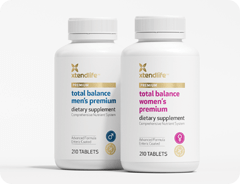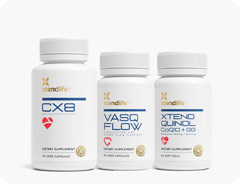What is the ‘Stinking Rose’? Here are some clues...If you are a fan of horror movies you will know that it has a reputation for fending off vampires. Or, at the very least, mosquitoes! This superfood offers a wide range of health benefits from cardiovascular and neurological improvement to protection from infectious disease.
Indeed, for centuries, the ‘Stinking Rose’ has been renowned for its remarkable medicinal properties: In Egypt, it was revered as a physical strength enhancer; in ancient Greece, its laxative properties were praised. It was even nicknamed “Russian penicillin” due to its effectiveness as a topical antibiotic for battle wounds.
Maybe by now you have guessed that the ‘Stinking Rose’ is humble garlic?
Garlic (Allium sativum) contains 33 sulfur compounds, 17 amino acids, antioxidants such as germanium and selenium, along with high levels of multiple vitamins and minerals like manganese, vitamin B6 and vitamin C. Garlic is also a good source of protein, thiamin (vitamin B1), phosphorus, calcium, potassium, and copper.
Of all these beneficial chemical compounds, allicin is the key sulfuric ingredient giving garlic its ‘unique’ aroma. Allicin is converted in the body to ajoene. All these elements offer six health-boosting benefits:
6 Key Benefits of Garlic
1. Heart disease
Ajone creates hydrogen sulphide gas (H2S) in the body, which makes smooth muscles relax and dilates blood vessels. This dilation keeps blood pressure under control and regulates or restores pressure to healthy levels. In so doing, blood flow remains healthy and nasty plaque build up and blood clotting are prevented. Stroke and thrombosis risks are reduced.
2. Cholesterol
Garlic helps to lower blood levels of triglycerides and LDL cholesterol - the "bad" forms – by as much as 20%. According to The Journal of Nutrition [1], several compounds in garlic can suppress the harmful oxidation of LDL. The researchers explained that it is this oxidation of LDL cholesterol that is the real cause of cardiovascular issues, not just the presence of LDL itself.
By preventing LDL cholesterol from oxidising and “going bad”, garlic plays an important role in promoting heart health.
3. Diabetes
Studies conducted in Japan, India, and Saudi Arabia show that garlic can help regulate and lower blood sugar. The Indian study found the allicin in garlic works with the B group vitamin thiamine to stimulate the pancreas to produce free insulin.
In fact, studies [2] have reported that giving fasting humans garlic oil and 100-125 mg/kg of S-allyl cysteine sulphoxide (SACS), a precursor of allicin, results in a significant decrease of blood glucose levels and in a raise of serum insulin.
SACS has also been shown to slow the glycation process. Glycation is caused by chronically high sugar levels and is the cause of the nasty side effects of diabetes such as damage toe eyes, kidneys, blood vessels and skin.
"Garlic in its liquid form has proved a potent block on glycation in a series of in-vitro tests we have conducted," said Dr Nessar Ahmed, "We are trying to understand why sugars destroy the body from the inside and have a particular interest in natural products and their therapeutic benefits."
4. Cancer
According to The National Cancer Institute studies show that regularly consuming garlic can lower the risk of pancreatic cancer by 54%, prostate cancer by 50%, colon cancer by 50%, and stomach cancer by 52%. Garlic has also been found to lower the risk of esophageal, breast, bladder, and skin cancers [3].
Experts aren’t sure exactly how garlic works to prevent cancer, but it’s likely to be due to garlic’s antibacterial properties, as well as its ability to:
- block the formation and halt the activation of cancer-causing substances [4][5],
- enhance DNA repair [6]
- reduce cell proliferation, or induce cell death [7].
5. Brain function
Garlic also offers proven cognitive benefits. Experiments in mice showed that aged garlic extract supplements increased the mice's life span and enhanced their learning ability and memory [8]. The garlic compounds, especially antioxidants, also protect the brain against free radicals thought to contribute to human Alzheimer's disease [9].
These experiments suggest that aged garlic extract supplements may help prevent physiological aging and age-related cognitive disorders in humans. Nerve cells exposed to these compounds showed an unusual ability to grow and branch, which may be associated with the enhanced memory function. No similar studies have been conducted with other garlic forms.
In addition, at the Medical University of South Carolina, scientists identified three garlic compounds which were effective against a type of terminal brain tumor called glioblastoma. Cancer cells require a lot of energy to grow rapidly, and glioblastoma cancer cells are fast-growers. In the study, garlic compounds actually produced "reactive oxygen species" in the cells, which caused the cancer to literally overeat and die.
6. Antimicrobial Action
Garlic has remarkable broad-spectrum antibacterial, antifungal, anti-parasitic and antiviral properties. It can kill a wide variety of harmful and disease-causing microbes and organisms. In contrast to the use of pharmaceutical drugs and antibiotics:
- harmful organisms are very unlikely to develop resistance to garlic.
- garlic is effective against a wide range of microorganisms. Chemical drugs usually only target one or a selected group of ‘enemies’.
- garlic selectively destroys harmful and bad organisms, leaving the good ones untouched. In fact, garlic even promotes their growth. Chemical drugs can destroy many of the good and friendly bacteria in the body.
Garlic’s ability to destroy microorganisms makes it an excellent remedy for cholera, dysentery, intestinal worms, smallpox, tetanus, tuberculosis and typhoid fever.
In fact, during World War I, garlic was used to treat typhus and dysentery. In World War II, it was applied in battle wounds to ward off septic poisoning and gangrene. It is still a staple in tropical medicine to fight typhus and cholera.
Even respiratory conditions and infections such as the common cold, coughs and sore throats have been alleviated with garlic.
How exactly do the health and medicinal properties of garlic protect against microbes?
A study published in the American Society for Microbiology’s Antimicrobial Agents and Chemotherapy explained how allicin fights infection by disabling two groups of enzymes found in a large variety of different infectious organisms, namely cysteine proteinases and alcohol dehydrogenases.
The former group causes infections, as they provide infectious organisms with the means to invade tissues and cause damage to them. The latter group plays a big part in the metabolism and survival of these organisms.
The Last Word
Can a clove a day keep the doctor away... and the vampires and mosquitoes?
The evidence clearly says “Yes”. Though of course, as with all good things, garlic needs to be used in moderation as part of a healthy diet and lifestyle.
Can garlic supplements do the same job?
Not really. In fact, we intentionally don’t include garlic in our supplements. This is because the processing required to make garlic into a powder includes ‘deodorizing’ which makes it lose much of its potency. It is much more effective to incorporate garlic into your everyday diet.
To enjoy the full benefits of the ‘Rose’, make sure you only choose organic, raw, crushed garlic, its oil, powder or aged extract. You can ‘neutralize’ the ‘Stinking’ aspect with fresh herbs, lemons, green tea and other natural means.
References:
[1]. Lau, BH. “Suppression of LDL oxidation by garlic compounds is a possible mechanism of cardiovascular health benefits.” J Nutr. 206 Mar. 136 (3 Suppl):765S-768S)
[2]. Sheela CG, Augusti KT. Antidiabetic effects of S-allyl cysteine sulphoxide isolated from garlic Allium sativum Linn. Indian J Exp Biol. 1992 Jun;30(6):523-6.
[3]. https://www.cancer.gov/about-cancer/causes-prevention/risk/diet/garlic-fact-sheet
[4]. Shenoy NR, Choughuley AS. Inhibitory effect of diet related sulphydryl compounds on the formation of carcinogenic nitrosamines. Cancer Letters 1992; 65(3):227–232.
[5]. Milner JA. Mechanisms by which garlic and allyl sulfur compounds suppress carcinogen bioactivation. Garlic and carcinogenesis. Advances in Experimental Medicine and Biology 2001; 492:69–81.
[6]. L'vova GN, Zasukhina GD. Modification of repair DNA synthesis in mutagen-treated human fibroblasts during adaptive response and the antimutagenic effect of garlic extract. Genetika 2002; 38(3):306–309.
[7]. Hsing AW, Chokkalingam AP, Gao YT, et al. Allium vegetables and risk of prostate cancer: A population-based study. Journal of the National Cancer Institute 2002; 94(21):1648–1651.
[8]. Moriguchi T, et al. Anti-aging effect of aged garlic extract in the inbred brain atrophy mouse model. Clin Exp Pharmacol Physiol 1997;24:235-42.
[9]. Numagami Y, et al. Attenuation of rat ischemic brain damage by aged garlic extracts: a possible protecting mechanism as an antioxidant. Neurochem Int 1996;29:135-43.


 Supplements
Supplements Bundles
Bundles









